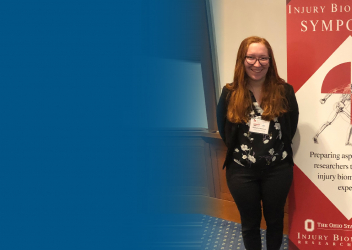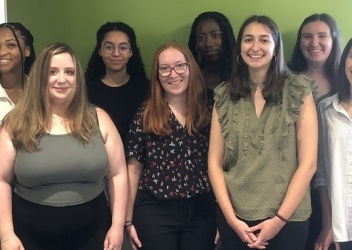Injury Science REU Research Projects
The Center for Injury Research and Prevention (CIRP) at Children's Hospital of Philadelphia (CHOP)'s Injury Science Research Experiences for Undergraduates (REU) Program offers projects in three areas of research:
CIRP is a leading multidisciplinary center engaged in collaborative cross-discipline research implementing real-world applications, and the Injury Science REU Program includes mentoring from a well-established team of highly trained pediatric researchers as well as peer mentors.

Scientist Valentina Graci, PhD collaborating with Injury Science REU alum Riley Nicholson on an Engineering Core project. Watch a video about training opportunities with the Injury Science Research Experiences for Undergraduates Program.
Engineering Core
All Engineering Core REU students will learn the design and conduct of laboratory-based and real-world engineering studies and the analysis and interpretation of the data collected. They may have opportunities to submit and present their work at conferences (e.g., The Ohio State University Impact Biomechanics Symposium and the Annual Meeting of the Human Factors and Ergonomics Society) with support from their mentors and to participate in the preparation of publications. They will be encouraged to work independently with appropriate mentorship and to generate enthusiasm and future career interest in engineering research that incorporates medicine and behavior for injury prevention.
Engineering Research Projects
- Project 1: Biomechanics in Automotive Safety and Rehabilitation Medicine
Mentor: Valentina Graci, PhD
Research Description
Motor vehicle crashes remain a leading cause of death for children, youth, and young adults. Historically, automotive safety research and advancements have focused on the mitigation of injuries once the crash has occurred. However, more recently automotive safety is switching its focus to studying ways to avoid crashes, such as Automated Emergency Braking (AEB). This technology provides a vehicle with the ability to stop automatically when an obstacle is detected. Since 2022 all new vehicles in the United States are equipped with AEB.
At the Center for Injury Research and Prevention at Children's Hospital of Philadelphia (CHOP)'s SLED Laboratory, we are interested in simulating different AEBs to understand how their decelerations influence occupant motion. Our team also collaborates closely with CHOP's Neuro-Motor Performance Laboratory (NMPL) and Division of Orthopedics to examine motor control and biomechanics performance in children with cerebral palsy and in adolescents who have undergone post-anterior cruciate ligament (ACL) reconstruction surgery.
REU Project Description
The REU student will become a member of the Engineering Research Core at the Center for Injury Research and Prevention and will receive mentorship from several of the lead investigators of the Core. Depending on the stages of projects, the student will be involved in various aspects of the research process, including designing and machining experimental fixture, data collection on human volunteers, post-processing, data analysis, and interpretation of the results.
The student will develop skills with data analysis of a diverse set of data types that could potentially be: motion capture and EMG data collection and/or analysis of children and young adults. Previous experience using MATLAB, CAD, and Solidwork is critical. The student will have the opportunity to increase skills in this area. The student will also gain experience in problem-solving, analyzing data, interpreting findings, and developing new research ideas. There may also be potential opportunities to submit and present the student's work at conferences and to participate in the preparation of journal publications. This project work is in person to allow the student to also participate in potential data collection or fixture modifications, besides data analysis.
- Project 2: Developing 3D Printed Anthropomorphic Models to Improve Clinical Training
Mentors: Michael Hast, PhD; Elizabeth Silvestro, MSE
Research Description
Knee injuries are a common complaint among children presenting to emergency rooms and primary care centers. A common sign of knee injury is effusion, a collection of fluid that can be encapsulated or burst. Current diagnosis begins with a physical exam, which relies on a subjective interpretation of manual examinations. Medical training programs provide minimal guidance with respect to accurately diagnosing pediatric knee effusions. At the same time, a misdiagnosis or delay in identifying knee effusions can impart longstanding complications to the joint, including growth disruption and loss of range of motion.
Because of this, MRI and ultrasound are currently used to provide clarity to the diagnosis, but this represents a significant increase in time spent in the clinic and includes a significant economic burden. Therefore, there is a need for a scalable solution to adequately prepare clinicians for manual pediatric knee evaluation. Hands-on trainers revolutionized training in cardiopulmonary resuscitation and offer an effective framework for improving manual diagnosis of pediatric knee effusions. The goal of this project is to design and develop 3-D printed models of physiologic and pathologic pediatric knees for the purpose of training medical professionals.
REU Project Description
The REU student will become a member of the Additive Manufacturing for Pediatrics 3D Lab at CHOP and the McKay Orthopedic Research Lab at the University of Pennsylvania. The student will be involved in various aspects of the research process, including data collection, data analysis, and interpretation of the results. The student will gain first-hand experience developing computational models, creating biofidelic models with 3D printing techniques, and performing mechanical testing with universal test frames.
The student must be enrolled in either a Bioengineering or Mechanical Engineering program. Previous experience with CAD programs, Finite Element Modeling, and coding with MATLAB and/or Python is desired but not required. The student will have the opportunity to increase skills in these areas and will also gain experience in problem-solving, data analysis, interpreting findings, and developing new research ideas. There will also be opportunities to submit and present the student's work at conferences and to participate in the preparation of journal publications.
- Project 3: Analysis of Pediatric Occupant Kinematics and Kinetics in Motor Vehicle Crashes
Mentor: Jalaj Maheshwari, MSE
Research Description
Motor vehicle crashes and incidents are a leading cause of injury for children, youth, and young adults worldwide. The Engineering team at the Center for Injury Research and Prevention strives to prevent these motor vehicle injuries through a variety of pediatric research projects using computational modeling and/or sled testing. Human body models and anthropomorphic test devices (ATDs), also known as crash test dummies, are a great tool to assess the kinematic and kinetic responses of an occupant under different crash conditions. We are analyzing the responses of pediatric occupants involving different crash conditions, vehicle restraint parameters, and child restraints. The occupant kinematics, kinetics, and injury metric data will be analyzed over the crash conditions to better guide passive safety systems (seat belts, airbags) and child restraint system development.
REU Project Description
The REU student will become a member of the Engineering Research Core at the Center for Injury Research and Prevention and will receive mentorship from several of the lead investigators of the Core. The student will be involved in various aspects of the research process including data extraction, data pre-processing, data analysis, and interpretation of the results. The student will be analyzing kinematic, kinetic, and injury data.
Previous experience using MATLAB and/or Python is required. Additional experience with finite element (FE) modeling is desirable but not required. The student will have the opportunity to increase skills in these areas. The student will also gain experience in problem-solving, data analysis, interpreting findings, and developing new research ideas. There will also be opportunities to submit and present the student's work at conferences and to participate in the preparation of journal publications.
Behavioral Science Core
All Behavioral Science Core REU students will be exposed to core behavioral science research methods – quantitative and qualitative – and will apply them in settings involving human subjects. They may have opportunities to submit and present their work at conferences (e.g., the International Study for Traumatic Stress Society Annual Conference, the CHOP LEND Research Day) with support from their mentors and to participate in the preparation of journal publications. They will be encouraged to work independently with appropriate mentorship and to generate enthusiasm and future career interest in behavioral science research that links behavior to medicine and engineering for injury prevention and prevention of traumatic stress among injured children.
Behavioral Science Research Project
- Project 4: Supporting Implementation of Trauma-Informed Practices Within Youth Serving Programs at the YMCA
Mentors: Hillary Kapa, MPH; Rachel Myers, PhD, MS
Research Description
Community-based organizations and programs play a vital role in both violence prevention and supporting recovery after experiences of trauma. Our team’s current community-engaged research efforts work in partnership with community members to address organizational needs to understand what works to prevent youth violence and support recovery. Informed by community-based participatory research practices and principles, we have several ongoing research studies to establish the impact of community-based programs and identify ways to support staff in providing trauma-informed services to young people and other community members affected by violence and trauma. These include an ongoing academic-community research collaboration with the Christian Street YMCA with the goal of addressing trauma and violence to create and sustain resilient communities. At present, our team is working with members of the YMCA leadership and program staff to operationalize how trauma-informed practices are implemented in community-based programs and to understand what resources are needed to sustain these practices.
REU Project Description
The REU student will work collaboratively with members of the research team and gain exposure to community-engaged research practices. Activities may include: collecting, coding, entering, managing, and analyzing data from quantitative and qualitative data sources; developing databases; participating in community meetings; observing program services; attending training activities and project team meetings; performing literature searches; retrieving and summarizing pertinent articles; and preparing documents for dissemination to internal and external partners. Competitive candidates for this position will have a demonstrated interest in public health, community-based research, violence prevention, and health equity. Prior coursework in Public Health; Psychology; Health Policy; Behavioral Health, or Health Sciences are required and at least one course in Research Methods is preferred.
- Project 5: Examining Learning to Drive, Risky Driving Behavior, and Crashes in Young Drivers
Mentor: Elizabeth A. Walshe, PhD
Research Description
Compared to adults, young novice drivers are three times more likely to be involved in a motor vehicle crash, which remains a leading cause of death and injury among adolescents. We are currently conducting a number of studies examining the relationship between driving skills, motor vehicle crashes, and the development of the neural and cognitive processes necessary for safe driving in adolescents and young drivers.
REU Project Description
The REU student will join a quantitative research team to primarily work on a NIH-funded randomized control trial to study how teens learn to drive and test novel interventions for improving driver safety. The key experience the student would get is in clinical data collection from CHOP teen patients from a number of Primary Care sites across the CHOP network (in and around Philadelphia). We will collect cognitive data, data from a novel virtual driving assessment, as well as survey data and driver monitoring data to longitudinally study learner drivers.
The student and other study staff will call patients to recruit and consent and travel to these clinical and community sites to meet with patients and families to conduct study visits. The student may also follow up with teens for ongoing data collection over time and may be involved in data management (checking incoming data and quality, and maybe some analysis). The student will also be exposed to many measurement tools and their data, including cognitive neuropsychological tests of brain function, eye-tracking, personality scales, and more.
The student may also have an opportunity to develop a number of valuable skills for a career in research by joining research team meetings and scientific discussions and assisting with a number of stages of the scientific research process (planning/lit reviews, testing, data collection, dissemination). We are looking for students who are interested in quantitative research, want to expand their research experience, and are motivated and excited to work on this team’s projects examining the brain and behavior of young drivers. We encourage diverse majors to apply, including (but not limited to): Psychology; Neuroscience; Public Health; Health Sciences; Engineering; Biomedical Engineering, or any other related major.
We are looking for students who are interested in quantitative research, want to expand their research experience, are willing to travel to clinical and community sites for data collection, and are motivated and excited to work on this team’s projects examining the brain and behavior of young drivers.
Epidemiology Core
All Epidemiology Core REU students will be exposed to survey design and administration and data analysis and interpretation. They will have opportunities to submit and present their work at conferences (e.g., the American Public Health Association’s Annual Conference) with support from their mentors and participate in the preparation of publications. Students will be encouraged to work independently with appropriate mentorship, to generate enthusiasm and future career interest in epidemiology, statistics, demography, and ethnography research that links the fields of medicine and behavior to injury prevention.
Epidemiology Research Projects
- Project 6: Health Behaviors and Transportation Outcomes for Vulnerable Populations
Mentors: Emma Sartin, PhD, MPH, CPST; Ashley Downs, MPH
Research Description
Researchers at the Center for Injury Research and Prevention (CIRP) are conducting a variety of research studies to examine health behaviors and transportation outcomes for vulnerable populations. Ongoing studies are examining the type of injuries that occur in motor vehicle crashes involving child passengers and that occur in motor vehicle crashes involving young drivers with and without ADHD.
REU Project Description
This student will participate in many aspects of a scientific research study and will have the opportunity to gain experience in applying various skills valuable to a future career in public health, health sciences, policy, or scientific research. The student may be involved in and responsible for tasks related to: literature reviews; database creation; data collection and management; IRB development; study development; and research participant phone calls and other interactions. In addition, the student will be able to participate in research meetings, scientific discussions, and CIRP-wide research meetings. The student should be motivated, enthusiastic, dependable, and detail oriented. Prior coursework in public health, psychology, social work, health policy, behavioral health, nursing, or health sciences and experience working with scientific data or in a scientific research setting is preferred, but not required. Possible projects are young drivers with and without ADHD and child passenger injuries.
- Project 7: Optimizing Concussion Care for Children and Adolescents
Mentor: Daniel Corwin, MD, MSCE
Research Description
The Minds Matter Concussion Research Program informs our leading concussion care at Children’s Hospital of Philadelphia. With a diverse patient population, we rapidly translate cutting-edge research into clinical care that advances target interventions, improves diagnostics, optimizes concussion treatment, and supports better long-term outcomes for pediatric patients. We have several on-going projects that have supported our concussion care initiatives, specifically a project aiming to improve equity for concussion patients seen at diverse sites throughout the CHOP care network. The project involves investigating barriers to accessing specialized concussion care from different community locations, testing our alternative approaches to accessing specialized care that may reduce disparities and improve outcomes to impact the lives of children more broadly.
REU Project Description
The REU student will work collaboratively with members of the CHOP Minds Matter Concussion team and gain exposure to a variety of research methodologies. Activities may include patient chart reviews, assistance with data coding/analysis, data management, and analyzing data from quantitative and qualitative data sources; attending training activities and project team meetings; and presenting preliminary findings to internal and external partners. The student will also gain experience problem-solving research challenges and developing research ideas that suit those seeking a career in human subject research. This work may be completed on-site or in the community. Prior coursework in Public Health, Psychology, Social Work, Health Policy, Behavioral Health, Nursing, Health Sciences or research methods is preferred, but not required.
This project is reserved for applicants from HBCUs and other Minority Serving Institutions. Find out if your school is eligible. For more information about Minority Serving Institutions, click here.
- Project 8: Cognitive and Circuit Impairments Induced by Mild Traumatic Brain Injury
Mentor: Akiva Cohen, PhD
Research Description
Traumatic brain injury (TBI) is the leading cause of death and disability in children and young adults. A TBI occurs on average every 21 seconds and afflicts approximately two million people annually in the United States. No effective therapy currently exists to treat TBI. A profound obstacle to the diagnosis and treatment of TBI is the absence of an objective, quantitative test for TBI. The difficulty in diagnosing TBI is due in large part to the overlap in symptoms between TBI and other conditions (e.g. stroke, migraine, PTSD, depression and non-convulsive seizures), as well as variability in the initial injury and clinical presentation. Therefore, we are determining the nature of a brain circuitry functional biomarker in mice that have received a mild TBI.
REU Project Description
The REU student will become a member of the Cohen Lab at the Children’s Hospital of Philadelphia Research Institute. The student will receive mentorship from the lead investigator, as well as from members of his laboratory. The student will learn various behavioral paradigms and immunohistochemistry, as well as cell counting and biochemistry. The student will also gain experience in problem-solving, data analysis, interpreting findings, and developing new research ideas. There will also be opportunities to submit and present the student's work at conferences and to participate in the preparation of journal publications.










